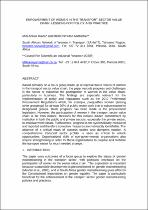 ResearchSpace
ResearchSpace
Empowerment of women in the transport sector value chain: Lessons for policy and practice
JavaScript is disabled for your browser. Some features of this site may not work without it.
- ResearchSpace
- →
- Research Publications/Outputs
- →
- Conference Publications
- →
- View Item
| dc.contributor.author |
Mhlanga, M

|
|
| dc.contributor.author |
Mokonyama, Mathetha T

|
|
| dc.date.accessioned | 2018-10-09T07:28:23Z | |
| dc.date.available | 2018-10-09T07:28:23Z | |
| dc.date.issued | 2018-07 | |
| dc.identifier.citation | Mhlanga, M. and Mokonyama, Mathetha T. 2018. Empowerment of women in the transport sector value chain: Lessons for policy and practice. Southern African Transport Conference (SATC 2018), CSIR ICC Pretoria, South Africa, 9-12 July 2018 | en_US |
| dc.identifier.uri | http://www.satc.org.za/assets/final-announcement-brochure-and-programme-2018-8.pdf | |
| dc.identifier.uri | http://hdl.handle.net/10204/10451 | |
| dc.description | Paper presented at the Southern African Transport Conference (SATC 2018), CSIR ICC Pretoria, South Africa, 9-12 July 2018 | en_US |
| dc.description.abstract | Based primarily on a focus group made up of representative voices of women in the transport sector value chain, the paper records progress and challenges in the sector to maximise the participation of women in the value chain, particularly in business. The findings are especially relevant for the implementation of policy and regulations such as the 2017 Preferential Procurement Regulations which, for example, prequalifies women (among other groupings) for at least 30% of public sector work that is subcontracted to designated groups. Much progress has been made in the procurement legislation. However, the participation of women in the transport sector value chain is far from mature. Reasons for this include diluted commitment by institution in both the public and private sectors, especially the private sector, to empowerment ideals. Furthermore, progress is not systematically measured and reported and therefore corrective measures are not readily identifiable. The absence of a critical mass of success stories also dampens traction. A comprehensive transport sector profiler is seen as critical to unlock opportunities. Organisational skills of non-governmental organisations also require strengthening in order for these organisations to prepare and mobilise the transport sector for much needed change. | en_US |
| dc.language.iso | en | en_US |
| dc.relation.ispartofseries | Worklist;21376 | |
| dc.subject | Gender mainstreaming | en_US |
| dc.subject | Empowerment of women | en_US |
| dc.subject | Transport sector value chain | en_US |
| dc.title | Empowerment of women in the transport sector value chain: Lessons for policy and practice | en_US |
| dc.type | Conference Presentation | en_US |
| dc.identifier.apacitation | Mhlanga, M., & Mokonyama, M. T. (2018). Empowerment of women in the transport sector value chain: Lessons for policy and practice. http://hdl.handle.net/10204/10451 | en_ZA |
| dc.identifier.chicagocitation | Mhlanga, M, and Mathetha T Mokonyama. "Empowerment of women in the transport sector value chain: Lessons for policy and practice." (2018): http://hdl.handle.net/10204/10451 | en_ZA |
| dc.identifier.vancouvercitation | Mhlanga M, Mokonyama MT, Empowerment of women in the transport sector value chain: Lessons for policy and practice; 2018. http://hdl.handle.net/10204/10451 . | en_ZA |
| dc.identifier.ris | TY - Conference Presentation AU - Mhlanga, M AU - Mokonyama, Mathetha T AB - Based primarily on a focus group made up of representative voices of women in the transport sector value chain, the paper records progress and challenges in the sector to maximise the participation of women in the value chain, particularly in business. The findings are especially relevant for the implementation of policy and regulations such as the 2017 Preferential Procurement Regulations which, for example, prequalifies women (among other groupings) for at least 30% of public sector work that is subcontracted to designated groups. Much progress has been made in the procurement legislation. However, the participation of women in the transport sector value chain is far from mature. Reasons for this include diluted commitment by institution in both the public and private sectors, especially the private sector, to empowerment ideals. Furthermore, progress is not systematically measured and reported and therefore corrective measures are not readily identifiable. The absence of a critical mass of success stories also dampens traction. A comprehensive transport sector profiler is seen as critical to unlock opportunities. Organisational skills of non-governmental organisations also require strengthening in order for these organisations to prepare and mobilise the transport sector for much needed change. DA - 2018-07 DB - ResearchSpace DP - CSIR KW - Gender mainstreaming KW - Empowerment of women KW - Transport sector value chain LK - https://researchspace.csir.co.za PY - 2018 T1 - Empowerment of women in the transport sector value chain: Lessons for policy and practice TI - Empowerment of women in the transport sector value chain: Lessons for policy and practice UR - http://hdl.handle.net/10204/10451 ER - | en_ZA |





